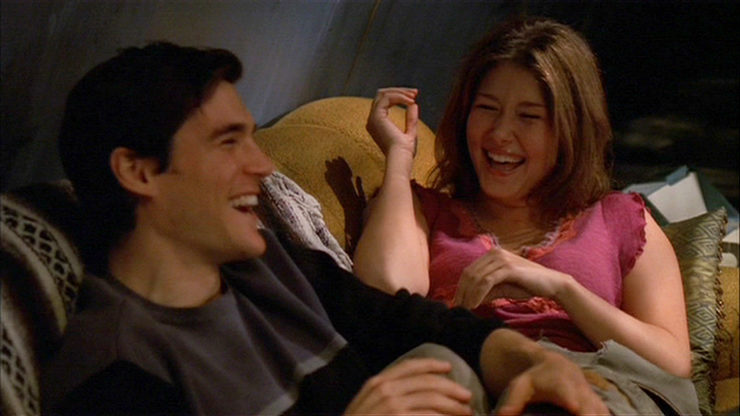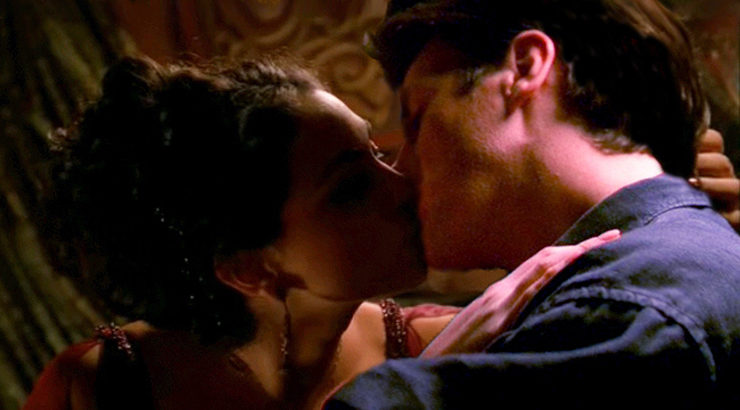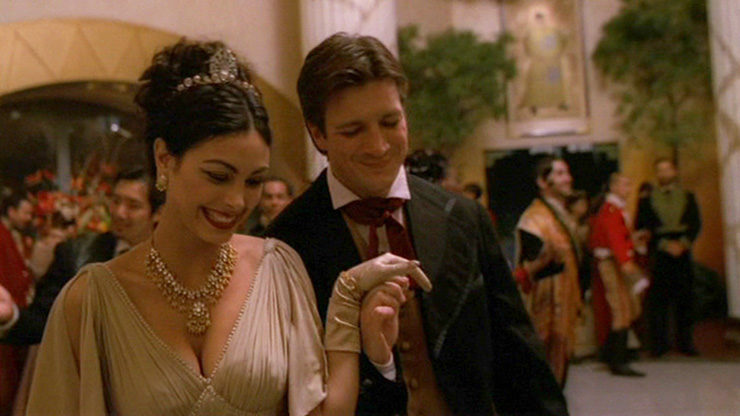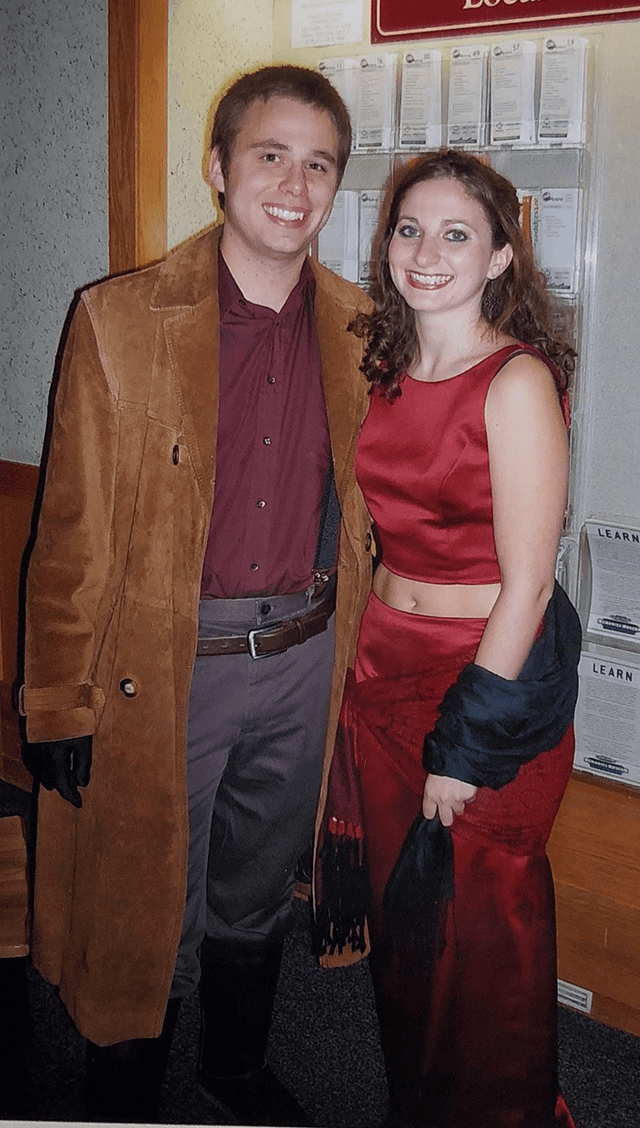It wasn’t quite love at first sight. But it was close.
I still remember the exact moment it happened. It was one hour and fifteen minutes into the pilot. When Malcolm “Mal” Reynolds walks onto the deck of Serenity, sizes up the hostage situation unfolding, and shoots the undercover Alliance agent in the head without breaking his stride, I literally rose off of my dorm bed and whooped. It was the kind of surprise that made me realize Firefly wasn’t going to be just like any other show. I fell, and I fell hard.
That almost never happens, when it comes to me and television. Usually, I need several episodes to fall in love with a new series. That’s sort of the point of TV, in my experience; you’re supposed to slowly build affection over several hours of investment. Pilots can be hard to love for that reason. It’s no small task to introduce a new cast of characters, establish a world, and explain any relevant backstory all while trying to get people to care enough to come back for more. When the show is science fiction or fantasy, the job is even more difficult.
I can count on one hand the number of pilots that made me fall in love with a series right away. So with Firefly, Joss Whedon’s short-lived space western, I fully expected to need time to get into it—although as it turns out, the pilot was all it took. The bigger surprise, though, was that my love of Firefly would help me discover the love of my life.
In case you’re not familiar with the saga of Firefly, the entire series, which ran on Fox from 2002-2003, contains only fourteen episodes. It’s still one of the most beloved science fiction shows of all time, gone too soon due to poor ratings. In 2005, thanks in large parts to the efforts of an enthusiastic fanbase, Universal released Serenity, a film which continued the story where the series had left off. That’s how I found it in my junior year at a small liberal arts college in suburban St. Louis. I loved Serenity, and so when I first got Netflix (at that time, a new subscription service that sent DVDs through the mail), I put Firefly at the top of my queue.
My first time watching the pilot, I thought for sure I knew what was going to happen. Lawrence Dobson, an undercover agent for the shadowy government organization called the Alliance, sneaks aboard the ship Serenity. Serenity is captained by Mal and his crew of mercenaries, who live on the margins of the universe in order to escape the Alliance’s control. Taking whatever odd jobs they can to survive, the crew has recently taken on several unsavory passengers. Dobson is in pursuit of two fugitives, Simon and River Tam, a pair of siblings with mysterious pasts. When the Serenity crew discovers Dobson is a Fed, they lock him up. But while Mal is out on another mission, Dobson escapes and takes River hostage.
I had seen this situation before. I was braced for a lengthy showdown between Mal and Dobson. I figured Mal would temporarily surrender, maybe try to bargain. There would likely be a last-ditch attempt to overpower Dobson, with Mal (or someone else) eventually re-gaining the upper hand. But instead, when Mal walks onto the deck and sees Dobson holding a gun to River’s head, he shoots him in the eye. From that moment on, I was a hardcore Browncoat.

I watched the Firefly pilot two more times that year. Both were attempts to persuade friends to love the show as much as I did. Both were largely unsuccessful. One of them walked away claiming, “it was good” but just “not really her thing.” She wasn’t interested in trying another episode. I was crushed. Another friend of mine, a short, curly-haired dance major named Katelyn, also didn’t love it at first. Yet she agreed to watch more. There was no such thing as streaming, and the term “binge watching” had yet to enter the lexicon. But that’s essentially what we did. I showed her Firefly every chance I could.
Katelyn and I were on staff as Resident Assistants in the residence halls. We had connected the previous spring after she wrote to me out of the blue while I was studying abroad in Thailand. We were acquaintances then, and when she reached out to tell me she liked an answer on my RA application, I responded enthusiastically. Separated by over 8,500 miles, we became pen pals. Over the ensuing months and the following summer, we consistently emailed back and forth, talking about a lot of things. We shared stories about our families, our childhoods, our favorite books, and so on.
When we started school again that fall, we hung out almost every day. I wanted to share Firefly with her, but I was also nervous about it. I was more than just a fan, I was a fanboy. I had books, compendiums. I watched the outtakes online. I read up on all the current rumors about whether or not the show would ever come back. I wasn’t sure what would happen if I confessed the extent of my Firefly love to her. What if she didn’t like it as much as I did? What if she didn’t like it all? What if she judged me or thought I was weird? But when you love something, you can’t keep it to yourself…
Sure enough, it took Katelyn five or six episodes to fall for Firefly. (Excruciatingly long, if you ask me.) After the episode “Shindig,” in which the crew attends a fancy ball, she was properly hooked—it was the dancing that finally did it. Firefly soon became our thing. We took turns watching it at each other’s places whenever we got together. We laughed and shared inside jokes. We talked about what would happen next and who our favorite characters were. We got tired of mailing the DVDs back and waiting for the next one, so I broke down and bought the set.
Firefly was such a special thing to us that we decided, as we approached the end, to finish watching it in style. One weekend over a holiday break, we built a fort around the TV in the residence halls and watched the last four episodes, plus Serenity, back to back. When it was over, Katelyn cried. I was thankful for it—it meant that she was just as in love as me.
Something else was happening, too. As we were both falling in love with Firefly, Katelyn and I were also slowly falling in love with each other. But like Mal and Inara, or Kaylee and Simon—the couples on the show who clearly liked each other but were afraid to admit it—our relationship was complicated. I liked Katelyn, but had recently been crushed by another girl and had no clue how to move on.
Beyond that, I was in my early twenties and I didn’t know who I was or what I wanted out of life. Things weren’t as simple as they had seemed just a few years ago. College was ending soon, and I would be forced out into the world to make it on my own. I was confused about a lot of things, but Firefly was a comforting constant in the midst of so much confusion, a kind of emotional touchstone. I knew I loved it, and having even one thing I was sure about helped provide some stability in an otherwise unsteady stage of life.

Having Katelyn there helped, too. She was my confidant, my source of encouragement. And although it might sound crazy, her love of Firefly, as gradual as it was in growing, helped me trust her. Science fiction and fantasy brings people together in a way that other stories don’t. A love for this genre requires a certain vulnerability—because of its bizarre, otherworldly nature, the necessary suspension of disbelief and the willingness to embrace incredible, fantastical elements that SFF requires, the genre is more personal to us. There’s something extra at stake knowing we might be forced to defend our fascination with aliens with wrinkled foreheads or mages that conjure light with the tap of a staff to people who just don’t see the appeal.
These elements make us more susceptible to criticism, more protective of what we love about them. When other people don’t see what we see in them, it often feels like a personal attack. As ridiculous as it seems, when you really love something, you start to question your compatibility with someone who doesn’t love it the same way: I can see myself with someone who doesn’t care much for Sherlock, but I can’t see myself with someone who has no interest in Star Wars.
When Katelyn started to love Firefly, it was like her acceptance of the thing I loved was also her acceptance of me. Plus, I could be certain that she had really good taste. It boded well for a future together. We started dating, and our first Halloween couples costume was Mal and Inara. It had been more than a year since we’d finished Firefly at that point, but it was a symbol of what helped bring us together.
We’ve now been married for over five years. There have been many other shows we’ve enjoyed together, some more than others. But no matter what comes next, Firefly will always be the first show we watched together—the one that brought us together. For that reason, I now have more than one reason to love it.
Matt Grant is a Brooklyn-based writer and lifelong SFF enthusiast. He is a contributor to Book Riot and the book news correspondent for Literary Hub. You can find out more on his website: www.mattgrantwriter.com or follow him on Twitter @mattgrantwriter.











